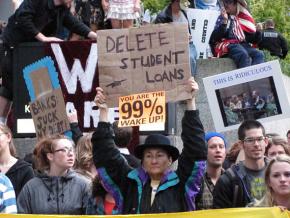Reports from Occupy: 11/15
The Occupy movement has spread from a small protest encampment in the financial district of Manhattan to a mass movement across the U.S.--and now the world--with supporters in over 1,000 cities, towns, campuses and more. Here, SocialistWorker.org is publishing reports we receive from activists around the country, describing the actions they're organizing and the discussions they're a part of. If you want to contribute a report, use this "Contact Us" page.
Seattle
By Steve Leigh
CHANTING "THE banks got bailed out and we got sold out" and "We are the 99 percent--and so are you" to passersby, over 200 students and workers marched from the University of Washington (UW) campus to local branches of Chase and Wells Fargo bank.
Chase is a particular target of the Occupy movement in Washington state since it took over Washington Mutual Savings Bank, laid off workers and took the tax breaks that had been granted to local banks. It also makes money off of a contract with the state for processing social service payments--and also charges the recipients an extra fee every time they obtain money from a state-issued bank card.
At the Chase branch, members of the United Auto Workers, which represents research and teaching assistants, presented a "check" to the manager. It was a check for $2 billion from Chase to the state of Washington. This represents the amount of tax money protesters said Chase owes to the state--based on the tax breaks it has received. Needless to say, Chase management refused to sign the check!

The $2 billion that Chase owes to the people of Washington is, coincidentally, exactly the size of the latest budget shortfall that the legislature must fill in November.
While the march was totally peaceful, the Chase branch was surrounded by 20 cops in full riot gear. After blocking traffic in front of the bank for a half hour and presenting the check, marchers returned to the University of Washington campus.
Before the march, the "99 percenters" met up for a rally. They listened to professors explain the depth and breadth of the attacks on public higher education. As one teacher explained, "There is a basic class in our program that everyone must take as a prerequisite. This quarter, we had 30 students who couldn't get in. This will delay their education. More of this will happen as the cuts get deeper."
An English-as-a-second-language teacher announced the formation of an American Federation of Teachers chapter for 80 of her coworkers to rousing applause from the rally. She pointed out the effects of the budget cuts: "No new high-tech equipment, lights that are burned out and not replaced, window blinds that you can't open or close, overhead projectors stashed in a corner, and classes that are closed."
SocialistWorker.org is regularly rounding up reports sent to us from around the country, describing the actions of the Occupy movement and the political discussions activists are having.News of the Occupy movement
The march and rally were sponsored by the United Auto Workers, the Washington Federation of State Employees, the Service Employees International Union, Working Washington and Occupy Seattle at the University of Washington.
Later in the afternoon, the same organizations sponsored a teach-in on the effect of the concentration of wealth on public university education. Janelle Taylor, president of the American Association of University Professors at UW, outlined her view of the budget crisis, which she saw as related to the attack on academic freedom. She stated:
The budget crisis is just an excuse for the right wing to do what it wanted to do anyway. Small, unprofitable programs are threatened. Slavic languages has been cut. In Anthropology, we cut an advising position and we have twice as many students. This means students won't get the advice they need.
Classes have gotten bigger. I can't give students the individual attention I used to be able to. Staff has been cut all over the university. Retiring faculty are not replaced. Instead, the university brings in part-time and temporary instructors. Their positions are so precarious that they fear to say anything controversial.
A university should be a place to follow the truth, wherever it leads. Truth may be unpopular. It may be inconvenient or only of interest to a few, but a university should still pursue it. Since over half of the faculty are now in insecure positions, they are less likely to follow the truth wherever it leads, especially if the results are controversial.
We need to reframe all of our experiences into a bigger picture to really understand the attacks on public education. It is part of the fight between the 99 percent and the 1 percent.
Her speech was followed by a lively discussion on solutions to the crisis in public education and state funding generally. When a libertarian criticized the "socialist" bent of the proceedings, the teach-in turned briefly into a debate on social democracy, socialism and unfettered capitalism.
People called for an end to the domination of money in politics and spoke in support of the coming rally against budget cuts, planned for the state capitol on November 28. The vast majority favored taxing the rich to pay for needed education and social services.
After the teach-in, the participants again marched up the street to protest Chase bank. Another teach-in is planned for November 16.
Occupy Seattle at UW does not have an encampment on campus, but it is planning more actions and educational events to support the movement of the 99 percent and show solidarity with Occupy Seattle, which is now based at Seattle Central Community College.


